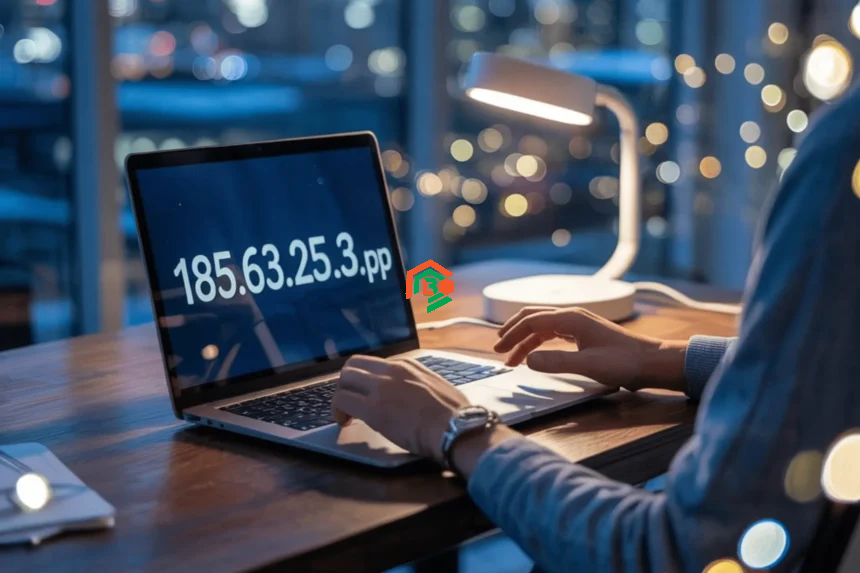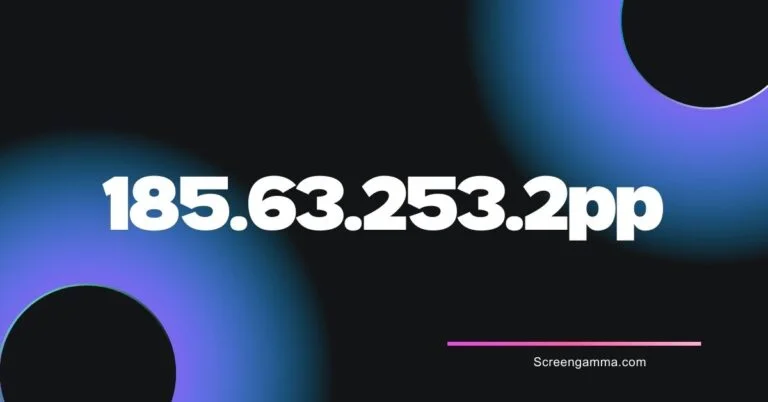Have you seen something like 185.63.253.2pp pop up on your screen and wondered what it means? Don’t worry, you’re not alone. Many people stumble upon this kind of code and feel confused. In this guide, we’ll explain everything in a simple and clear way so you can understand what it is, why it matters, and how it might affect you.
What Does 185.63.253.2pp Mean?
The number 185.63.253.2pp looks like an IP address, which is a unique number assigned to every device connected to the internet. But there’s something different here: the extra “pp” at the end.
Normally, an IP address looks like this: 123.45.67.89 — just four sets of numbers. But 185.63.253.2pp includes letters, which is not a standard format for traditional IPv4 addresses. It may be a typo, a modified IP, or a tag used in a log or tool for tracking or logging something specific.
Many people search for strange IPs like this because they see them in:
- Website logs
- Server error reports
- Suspicious traffic monitors
- Email headers
- Firewalls or antivirus alerts
So if you’re seeing 185.63.253.2pp, it’s likely part of a bigger system or tool analyzing web traffic, spam, or cybersecurity issues.
Where Is 185.63.253.2pp Located?
Most people want to know where an IP address like 185.63.253.2pp is coming from. Based on tools like IP location lookup or WHOIS database, the core IP address (185.63.253.2) points to a United States location. Specifically, IPs starting with 185 are often registered to hosting companies or cloud providers. These can be in cities like New York, Chicago, Dallas, or even in data centers located outside of major metro areas.
Keep in mind that the “pp” doesn’t change the location — it’s just an add-on or label used by some tools or logs. The real IP, 185.63.253.2, is traceable to a physical server or provider, and many IP lookups confirm its origin in the US region.
Why Should You Care About 185.63.253.2pp?
You might think, “Why should I care about a random number?” Well, IP addresses are important for your privacy, security, and even your internet performance. If you run a website, manage a server, or just care about your internet safety, it’s useful to know if an IP like 185.63.253.2pp is good or bad.

Maybe your website got a strange visitor from this IP.
Maybe your antivirus flagged this as suspicious.
Maybe it keeps popping up in your analytics.
That’s when you start digging into what it really is.
Is It Dangerous?
That depends. IP addresses by themselves aren’t dangerous. But if 185.63.253.2pp is tied to spam, malware, or hacking attempts, then yes — it might be dangerous. You can use tools like VirusTotal, AbuseIPDB, or Spamhaus to check if the IP is reported for abuse.
If many people are reporting problems from this IP, you should block it from accessing your site or device.
Can You Block It?
Yes, absolutely. If you think 185.63.253.2pp is suspicious or harmful, you can block it using:
- Your website’s firewall (like Cloudflare or Wordfence)
- Your server’s iptables or UFW rules
- Your router settings (home or office)
Blocking an IP helps protect your systems from bad traffic or bots.
Is It Real-Time?
Yes, some tools allow real-time IP tracking, which means you can see traffic from 185.63.253.2pp the moment it happens. Tools like Google Analytics, Matomo, or Cloudflare logs help track real-time visitors and flag unusual IPs instantly.
Tools to Check 185.63.253.2pp Details
So how do you find out more about this IP? Easy! There are many free and paid tools that let you explore every detail of 185.63.253.2pp. Some top tools include:
- Ahrefs Site Audit – great for finding traffic from strange IPs to your site.
- SEMrush Log File Analyzer – tells you which bots or IPs are crawling your site.
- IPinfo.io – shows full location, ISP, and hostname of the IP.
- AbuseIPDB – checks if the IP is blacklisted.
- MXToolbox – great for mail server-related lookups.
- WHOIS Lookup – shows owner and registration details.
You can also use basic command-line tools like ping, nslookup, or traceroute to see how the IP behaves.
185.63.253.2pp and Website Safety
If you run a website, security is key. Suspicious IPs like 185.63.253.2pp can be involved in:
- DDoS attacks
- Brute-force login attempts
- Spam comments
- Scraping your content
- Trying to find vulnerabilities
Use security plugins or services to monitor these IPs. Tools like Wordfence, Sucuri, and Cloudflare can alert and block suspicious behavior in real time.
Also, check your access logs regularly. If you see lots of requests from 185.63.253.2pp and they look suspicious, block them right away.
How to Look Up an IP Like 185.63.253.2pp
So, how do you check where an IP is from or what it’s doing? That’s where IP lookup tools come in. It’s like typing someone’s name into Google — but instead, you’re checking the background of an IP address.

What Is an IP Lookup?
An IP lookup is a tool that tells you:
- The country and city the IP is from
- The ISP (internet provider) that owns it
- If it’s from a VPN, proxy, or data center
- If it’s blacklisted for spam or abuse
- What websites or domains it may be linked to
This is useful for website owners, cybersecurity experts, or even curious users.
Free Tools to Use
There are tons of free IP lookup tools available online. Here are a few of the best:
- IPinfo.io – one of the most accurate IP trackers
- WhatIsMyIPAddress.com – simple and clear info
- AbuseIPDB.com – shows user reports and abuse logs
- Talos Intelligence (by Cisco) – shows threat levels
- IPVoid.com – fast blacklist checker
- WHOIS.domaintools.com – shows owner records
All of these work for 185.63.253.2pp once you remove the “pp” and use the base IP: 185.63.253.2
Can 185.63.253.2pp Affect My Internet?
Yes, it can — in some cases. If this IP is involved in malicious activity and it’s in your logs, it may be:
- Trying to scan your ports
- Sending malicious requests
- Slowing down your site
- Affecting your internet reputation (if emails come from it)
In other words, it won’t usually affect your internet speed, but it can cause issues for web servers, apps, or email services. If you’re on shared hosting, a bad neighbor IP like this can even affect your domain reputation.
Thoughts on 185.63.253.2pp
We live in a digital world where numbers like 185.63.253.2pp are everywhere. While it may look random, it actually holds a lot of data. Whether it’s from a bot, a user, or a tool, knowing how to read and understand IP addresses can help you stay safer online.
So next time you see a strange IP, don’t panic — investigate.
The Bottom Line
In simple terms, 185.63.253.2pp is most likely a modified or tagged IP address that points to a real US-based server — 185.63.253.2. The “pp” may be just a label added by a monitoring tool. You can look it up using free IP lookup tools, check if it’s blacklisted, and block it if needed.
If it shows up in your logs, it’s worth checking — it could be harmless, or it could be a sign of suspicious activity. Always stay alert, use the right tools, and keep your digital space clean and secure.


